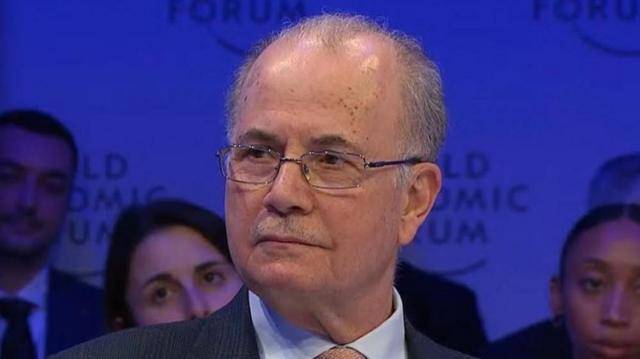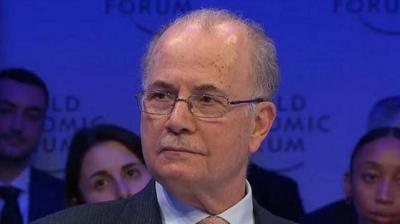Despite being tasked with forming a new Palestinian government under sensitive and challenging circumstances amid the ongoing Israeli war on Gaza, the designated Palestinian Prime Minister, Mohammad Mustafa, confirmed that he will present his government within the legal deadlines, pledging to implement reforms within the institutions of authority. He sees reform as a necessity and a national interest, with the ultimate goal of establishing a robust, solid, and accountable governance system.
In a comprehensive interview with the Arab World News Agency, he expressed confidence in overcoming the current phase despite the destruction and devastation caused by the war in Gaza. He stated that his plans include serious reforms in various areas and said, "We strive to improve financial standards, achieve transparency, enhance revenues, rationalize expenditures, develop education and all services, especially health, reduce bureaucratic procedures, strengthen the rule of law, combat corruption, ensure human rights and freedom of expression, enhance the role of civil society and oversight bodies, and prepare for legislative and presidential elections."
Commenting on the prevalent stereotype of the Palestinian Authority in international media as a "corrupt authority," he said, "Our policy is based on zero tolerance for any corruption in our national institutions. Through my practical experience at the World Bank and other positions in the homeland, I fully realize that the existence of an accountable government is crucial not only for gathering international support and credibility but, more importantly, for winning the trust of our people who have suffered for decades from successive tragedies."
Regarding the possibility of overcoming the current phase amid the destruction caused by the war, the designated Palestinian Prime Minister said, "The short and direct answer is yes, but the more important question is how?" He continued, "We are very aware of the horrific events happening and the level of destruction and deprivation we have experienced and continue to experience since the beginning of the occupation is indescribable. We have lost more than 30,000 martyrs in less than six months, a staggering number, especially since approximately 13,000 of them are children. The Israeli war machine has destroyed nearly 60% of Gaza's homes, and all systems such as education and health have collapsed, in addition to the lack of water, food, and electricity."
He added that "the war and aggression in the West Bank are also very serious; settlements continue, and the violence and terror of settlers are increasing. Checkpoints turn cities into small cantons, and our economy suffers from the piracy of our funds to the extent that paying salaries and living a stable life has become a difficult task." He emphasized that Palestinians are at a dangerous crossroads that raises questions about the ability to endure and innovate to overcome these crises, saying, "Therefore, we see that this is the ideal time to work, not only to confront what is happening now, especially prioritizing relief and then recovering for our people in the sector, but also to set out a comprehensive vision that leads to ending the Israeli occupation and realizing national rights for freedom and independence, now, and once and for all."
Additionally, he believed that the war and the tragedies it left behind have placed the Palestinian cause again at the top of the world's priorities, adding, "It is our duty not to let these tremendous sacrifices go in vain, and for this war to be the last in the liberation journey, and to end the occupation." He also expressed his belief that the world is now more determined to effect real change, "because it understood the message that this conflict cannot end without the Palestinian people obtaining their rights. Therefore, we see it is essential now to chart a clear path to stop the war and humanitarian disaster in Gaza and to develop a roadmap leading to ending the occupation and establishing an independent Palestinian state based on the 1967 borders with East Jerusalem as its capital." He also called for a comprehensive and permanent ceasefire "to put an end to these crimes and stop the bloodshed."
Regarding how the government will achieve its vision in light of the difficult economic situation, Mustafa said, "We fully recognize that this is a daunting task due to the occupation’s control over our resources, the piracy of our funds, and our reliance for decades on external aid which has gradually begun to decrease in recent years." However, he added, "To address this situation, we must work on several simultaneous paths. In the short term, we need to find financial resources and take advantage of the international situation to stop the piracy of our funds. In the medium term, we must develop mechanisms that make these resources sustainable and unassailable politically. In the long run, we should diversify sources of income and rationalize expenditures to be on the right track to lay the foundations for a resilient national economy capable of sustaining and thriving."
He confirmed that the immediate priority of his government is urgent humanitarian relief in Gaza. Regarding reconstruction, he said, "We intend to propose a plan that includes creating an independent and specialized authority managed by a professional team of qualified individuals that will undertake the reconstruction and establish a trust fund to collect the necessary funds, manage them, and disburse them transparently, and it should be managed by one of the international institutions with relevant expertise, such as the World Bank or the United Nations Development Program."
It is noteworthy that Mustafa’s appointment came following the resignation of former Prime Minister Mohammad Shtayyeh, who stepped down less than 20 days ago amid repeated U.S. calls for reform of the Palestinian Authority. The new Prime Minister will face a massive administrative and diplomatic task, following the transformation of large areas of Gaza into rubble, the displacement of most of its 2.3 million residents, and their urgent need for aid, while the Palestinian Authority, established three decades ago under the temporary peace agreement known as the Oslo Accords, maintains limited governance over parts of the occupied West Bank. However, it could play a key role in managing Gaza once the war ends, although Israeli Prime Minister Benjamin Netanyahu has strongly opposed its involvement in managing the sector.




